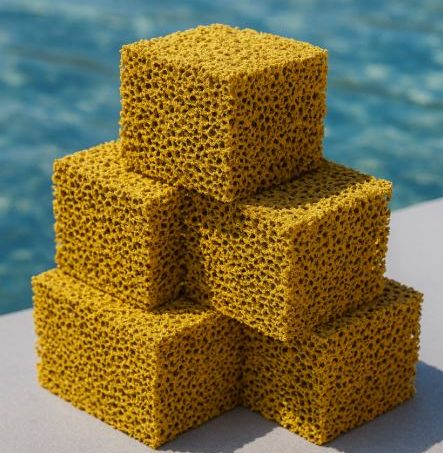Overview
k-Foam combines the proven redox performance of KDF®-55 copper-zinc alloy granules with the structural benefits of open-cell polyurethane foam. The result is a functionalized composite media that promotes electrochemical oxidation–reduction reactions while maintaining optimal hydraulic flow and minimal pressure loss.
The foam’s high void volume and tortuous flow path enhance contact efficiency, maximizing the reactive surface area of the embedded metal alloy.
Performance Advantages
- Chlorine Reduction: Rapid and complete conversion of free chlorine into benign chloride ions.
- Heavy Metal Removal: Effectively reduces lead, mercury, cadmium, arsenic, and other water-soluble metals via redox displacement and plating reactions.
- Bacteriostatic Properties: Inhibits microbial growth within the media, extending service life and reducing biofouling.
- Enhanced Flow Dynamics: Open-cell foam design minimizes pressure drop and prevents channeling.
- Customizable Configurations: Available in various pore densities (10–60 PPI) and metal loadings to meet system-specific flow and performance requirements.
Technical Summary
| Property | Typical Value | Description |
|---|---|---|
| Base Material | Reticulated Polyurethane Foam | Open-cell, customizable porosity |
| Functional Additive | KDF®-55 Copper-Zinc Alloy | EPA-registered redox media |
| Density Range | 0.30 – 0.70 g/cm³ | Dependent on alloy loading |
| Pore Size | 15 – 30 PPI | Tuned for flow and contact time |
| Operating Temperature | 120 °C | Stable under potable-water conditions |
| Typical Pressure Drop | < 10 mbar (at nominal flow) | High permeability structure |

